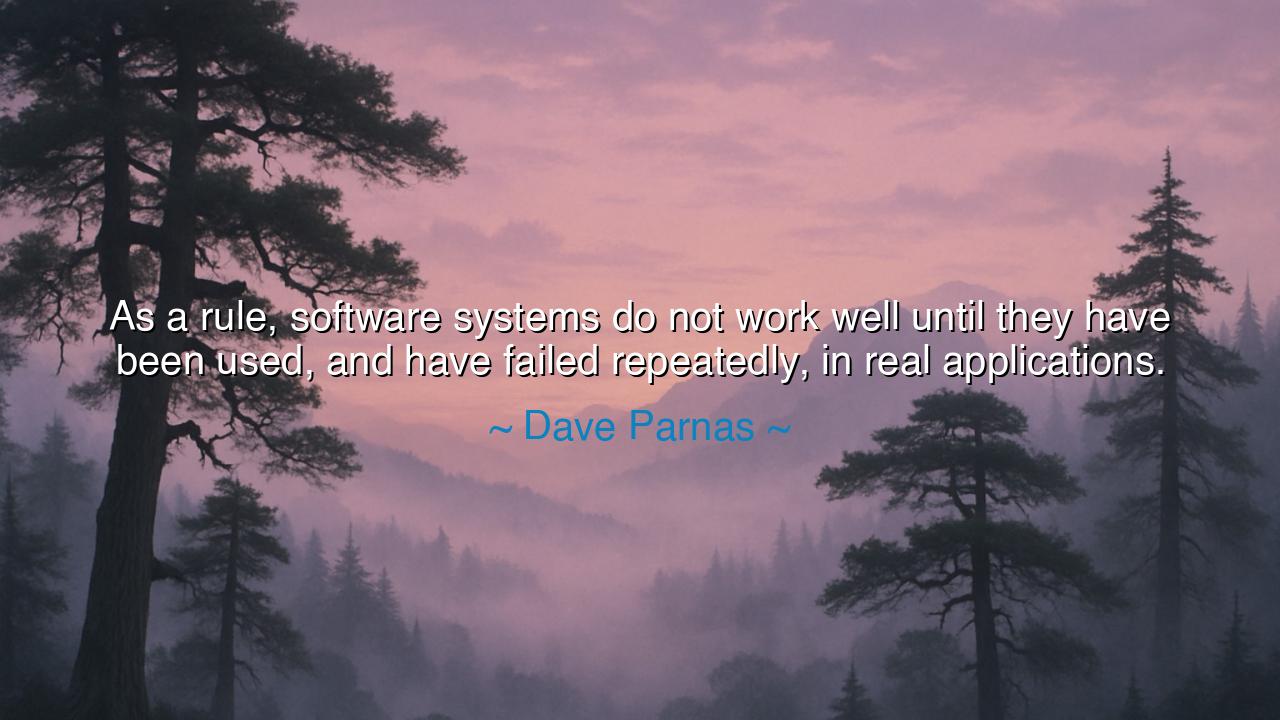
As a rule, software systems do not work well until they have been
As a rule, software systems do not work well until they have been used, and have failed repeatedly, in real applications.






In the creation of any great work, be it in technology, art, or philosophy, there is one undeniable truth: true mastery does not come from initial success, but from the ability to fail, learn, and adapt. Dave Parnas, in his wisdom, declares, "As a rule, software systems do not work well until they have been used, and have failed repeatedly, in real applications." In these words, Parnas speaks not only of software but of the very nature of human endeavor. The path to greatness is not paved with perfection from the start, but with the courage to confront failure, learn from it, and continue moving forward. This is the essence of creation itself—through trial, we come to understand, and through failure, we find the keys to success.
In the ancient world, Greek philosophers understood this process well. Socrates, the great seeker of truth, did not claim to have all the answers; instead, he questioned, prodded, and sought knowledge through dialogue and examination. His method was one of trial and error, where each conversation and each response offered an opportunity to refine his understanding. Socrates knew that to discover truth, one must be willing to fail in one’s assumptions, to be challenged, and to grow through that struggle. Similarly, in the creation of software systems, as in life, the process of testing, failing, and learning is where true understanding emerges.
Parnas’s quote resonates with the scientific method, which has its roots in the works of Aristotle and Galileo. These men did not arrive at the truths of the universe through a single, flawless experiment. Instead, they experimented, they failed, and through failure, they built the framework for future discoveries. In the same way, software—those complex systems designed to solve human problems—must be tested in the real world, facing the unexpected and unseen. Only through failure can we refine, adjust, and ultimately make the system work. It is in the crucible of application that ideas are tested, and true insight is gained.
Consider the story of Thomas Edison, who, in his quest to develop the electric light bulb, famously encountered countless failures before finding success. He did not regard each failure as a defeat, but as a step toward the solution. Edison’s approach was not one of perfection at first sight but of learning from every experiment, no matter how many times they fell short. Similarly, the creation of software systems requires the same kind of resilience and adaptability. Parnas’s statement highlights this crucial point—failure is not the opposite of success, but an integral part of the creative process. The most reliable systems emerge not from initial perfection, but from repeated testing, learning, and evolving.
In ancient Chinese philosophy, particularly in the teachings of Confucius, the idea of learning through experience and reflection is central. Confucius emphasized that true wisdom comes not from the mere acquisition of knowledge, but from the application of that knowledge in real-life situations. He believed that through reflection on one’s actions, especially the mistakes and failures, one could grow in virtue and understanding. This concept aligns beautifully with Parnas’s observation that software systems, like all creations, must endure the trials of failure before they can function optimally. It is through the real-world application of ideas, through experimentation and error, that one truly learns how to make something work.
The lesson here is clear: success is not found in avoiding failure, but in embracing it as an essential part of the creative process. Parnas teaches us that true mastery is achieved not through flawless execution at the outset, but through the willingness to confront and learn from our failures. This is a truth that applies not only to software development but to any human pursuit. Whether we are building systems, creating art, or striving to improve ourselves, the path to excellence is paved with failures. Each setback is not a defeat but a step toward a greater understanding of what works and what does not.
In practical terms, we must approach our work, whether in technology or in life, with humility and perseverance. Let us not be discouraged by the inevitable failures that will arise but instead recognize them as opportunities for growth. Just as Edison used his failures to refine his inventions, so too should we view each mistake as a vital learning experience. Whether we are building a piece of software, creating a piece of art, or pursuing a personal goal, we must test, fail, reflect, and adapt. Through this process, we will move ever closer to the mastery we seek.
In the end, Parnas’s wisdom calls us to be patient with ourselves and with our creations. True success is not born from perfection, but from the willingness to learn, to fail, and to rise again. Let us remember that the greatest accomplishments, whether in technology or in life, come not from avoiding failure but from embracing it as an essential part of our journey toward mastery. Through trial and error, we shall ultimately create not just functioning systems, but works that reflect the depth of human ingenuity and resilience.






AAdministratorAdministrator
Welcome, honored guests. Please leave a comment, we will respond soon